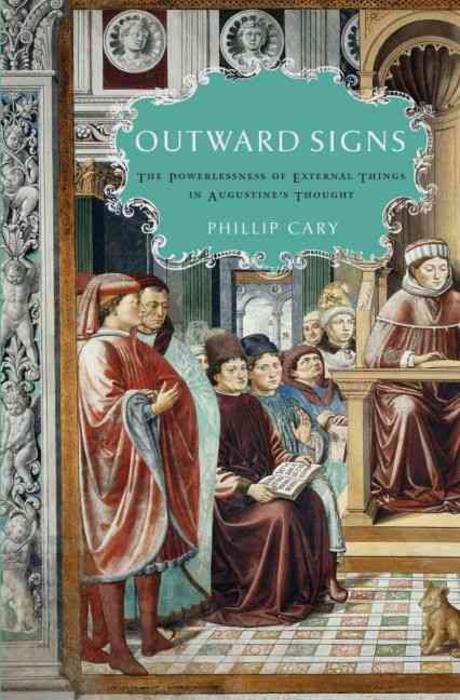Outward signs : the powerlessness of external things in Augustine's thought
Outward signs : the powerlessness of external things in Augustine's thought
- 자료유형
- 단행본 서양서
- 최종처리일시
- 20100106172314
- ISBN
- 9780195336498 (alk. paper) : $74
- ISBN
- 0195336496 (alk. paper)
- DDC
- 230.14092-22
- 청구기호
- 230.14092 C333o
- 저자명
- Cary, Phillip , 1958-
- 서명/저자
- Outward signs : the powerlessness of external things in Augustines thought Phillip Cary
- 발행사항
- Oxford : Oxford University Press, c2008
- 형태사항
- xxiv, 344 p ; 25 cm
- 서지주기
- Includes bibliographical references (p. [323]-333) and index.
- 내용주기
- 완전내용Introduction: Expressionist semiotics and the powerlessness of the external -- Inadequate platonist signs -- Downward causality -- Mother and child -- Why lectures get boring -- Shared vision -- Words from which we learn nothing -- Before words were signs : semiotics in Greek philosophy -- Semiotics and semantics -- Words written on platonic souls -- The logic of Aristotle's signs -- Physiognomic inferences -- Body affecting soul -- The semiotics of On interpretation -- Stoic semiotics without depth -- Empirical inference and "common signs" -- The sceptics' reminding signs -- Reminders of deeper things -- From scepticism to platonism : the concept of sign in Augustine's earliest writings -- Plato's sceptical successors -- The grasping appearance -- Zeno's definition -- The point of academic scepticism -- The wise man needs depth -- The status of the truthlike -- The two kinds of similarity -- How words became signs : the development of Augustine's expressionist semiotics -- Signifying reason -- Words that signify -- A Latin orator's signs -- Giving signs -- The ontological ground of convention -- Fallen language -- Signs moving souls -- Why we learn nothing from words : the epistemology of Augustine's semiotics -- A socratic dialogue about teaching -- The on the teacher thesis -- Christ the inner teacher -- Learning nothing from Scripture and proof -- Admonitions to look inside -- Authority and reason -- Christian mysteries and platonist philosophy -- The great shift in Augustine's teaching -- Believing persons : theological implications of Augustine's semiotics -- Secondhand knowledge -- Belief in things not seen -- Testimony about temporal things -- Witnesses to Christ -- Moses and truth -- Seeing trinitarian love -- Outward voice and inner word -- Words forming persons? -- Powerless sacraments -- Sacred signs of inner unity : Augustine and medieval sacramental theology -- Election and sacraments -- The meaning of "Sacrament" -- Signs of grace? -- The invisible sacrifice -- Taking victorinus to heart -- Puzzles in confessions -- Public inner wisdom -- Shared insight and love's union -- Words and common inquiry -- The efficacy of the church's baptism : against donatists and pelagians -- Validity without efficacy -- The efficacy of unity -- The immediate return of sins -- Unity in adam -- Unity in Christ -- Conversion and perseverance -- The soul of Christ -- New Testament sacraments and the flesh of Christ -- Sacraments old and new -- When promising is giving -- The education of the human race -- Fewer and less burdensome -- The virtue of the sacraments -- Sacraments promising Christ -- Powerless blood -- Spiritual eating.
- 주제명-개인
- Augustine Saint Bishop of Hippo
- 일반주제명
- Semiotics
- 일반주제명
- Signs and symbols
- 책소개
-
We are used to thinking of words as signs of inner thoughts. In Outward Signs, Philip Cary argues that Augustine invented this expressionist semiotics, where words are outward signs expressing an inward will to communicate, in an epochal departure from ancient philosopical semiotics, wheresigns are means of inference, as smoke is a sign of fire. Augustine uses his new theory of signs to give an account of Biblical authority, explaining why an authoritative external teaching is needed in addition to the inward teaching of Christ as divine Wisdom, which is conceived in terms drawn fromPlatonist epistemology. In fact, for Augustine we literally learn nothing from words or any other outward sign, for the truest form of knowledge is a kind of Platonist vision, seeing what is inwardly present to the mind. Nevertheless, because our minds eye is diseased by sin we need the help ofexternal signs as admonitions or reminders pointing us in the right direction, so that we may look and see for ourselves. Even our knowledge of other persons is ultimately a matter not of trusting their words but of seeing their minds with our minds. Thus, Cary argues here, outward signs for Augustine are useful but ultimately powerless because no bodily thing has power to convey something inward to the soul. This means that there can be no such thing as an efficacious external means of grace. The sacraments, which Augustine was the first todescribe as outward signs of inner grace, signify what is necessary for salvation but do not confer it. Baptism, for example, is necessary for salvation, but its power is found not in water or word but in the inner unity, charity and peace of the church. Even the flesh of Christ is necessary but notefficacious, an external sign to use without clinging to it.


